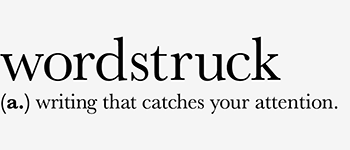I really enjoy my job as a creative copywriter. I spend most of my days reading and writing things. Sometimes I’m coming up with new ideas, other times I’m just helping other people get their message across. It also means I get to see a lot of things that often confuse us when we’re writing (even me). So here’s my quick guide to some of the things I see every day that cause the most head scratching:
The apostrophe
The apostrophe ’ often seems to cause confusion. It appears where it’s not needed and goes AWOL when it is.
The apostrophe has two main uses:
1) To show something belongs to someone or something.
2) To show there’s a letter or letters missing from a word.
1) Using the apostrophe to show ownership or belonging
The client’s software (one client)
Doris’ business (in this example Doris’s is also correct, but we prefer the less cluttered punctuation)
The children’s father
My clients’ business (more than one client)
But AVOID the green grocer’s apostrophe e.g.
The apple’s, the cauliflower’s, the carrot’s
When I see examples like this I always want to ask, ‘The apple’s, cauliflower’s, carrot’s, what?’
Note Possessive pronouns like yours, his, hers, ours, its and theirs are not followed by the apostrophe.
2) Using the apostrophe to show there’s something missing
There are lots of examples of this. Some we use everyday without really thinking about them:
I’m; you’re; we’re – I am; you are; we are
Don’t, won’t, haven’t, isn’t – do not; will not, have not, is not
Others sometimes seem to cause confusion:
Let’s for let us
Common mistakes
There are four common cases where it is easy to get confused.
It’s has an apostrophe when it means it is. When you want to show possession, the correct form is its.
It’s a long way to Tipperary.
Every business has its challenges.
Who’s stands for who is or who has. When you want to show possession, the correct form is whose.
Who’s running the company?
The manager, whose business was doing well, booked a well-deserved holiday.
If you can replace the word with “you are”, then the word you’re looking for is you’re. If you want to indicate that something belongs to someone, you need your.
You’re going to have a busy month.
Is this your tax return?
They’re stands for they are. The possessive is their.
They’re the people who bought our business.
It’s their business now.
If you want to show where something is, the correct form is there.
The business is over there.
Still confused? Check out this humorous, comic style guide to how to use an apostrophe.
Words that sound similar but are spelt differently
license (v) / licence (n)
practise (v) / practice (n)
advise (v) / advice (n)
To get these right, you basically have to know your nouns from your verbs. Remember from your English lessons, a noun refers to a thing and a verb is a ‘doing word’. Then use this sentence to help you choose the right spelling:
Stop the crocodile.
Any time you want the verb, use ‘s’ – like you do when you say ‘stop’. If you want the noun, it’s a ‘c’, as in crocodile.
license and licence:
He may be licensed to kill, but James Bond was still booked for driving without his driving licence.
practise and practice:
Mr Jones likes to practise his juggling at his accountant’s practice.
advise and advice:
You can advise people as much as you like but you can’t get them to listen to your advice.
Words that sound similar but mean different things
compliment / complement
A compliment is a nice thing said about someone. So if you say, “I like your new dress”, you’re paying someone a compliment. Something that’s given away free is also complimentary.
Complimentary drinks with every meal.
Complement has a number of meanings associated with matching or completing.
If you’re ordering business cards, why not choose some complementary letterheads?
stationery / stationary
It’s easy to remember the difference between these two. Just remember ‘e’ is for envelope and ‘a’ is for ‘at a standstill’.
affect / effect
To affect something is to change or influence it.
The computer failure affected her business.
Effect has a lot of subtle meanings as a noun, but it mostly refers to something that’s happens as a result of something else.
The new layout had a positive effect on the magazine’s circulation.
Effect is also a rather formal way of saying to make it happen.
The Government has effected a change in policy.
Most of the time affect is a verb and effect is a noun.
Some other places to go to if you get stuck
Online dictionaries
www.askoxford.com/?view=uk
(check out their better writing section too)
http://dictionary.cambridge.org/
Online thesaurus (for when you’re short of an alternative word)
http://thesaurus.reference.com/
(watch out for US spellings though)
More grammar resources and style guides:
Daily Writing Tips
Economist styleguide
Guardian styleguide
